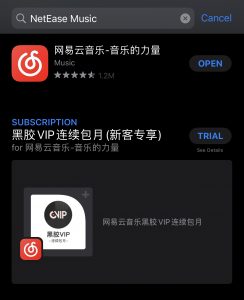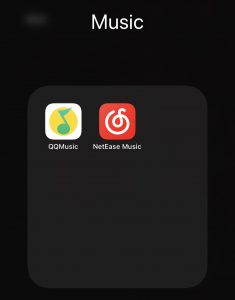
Introduction
In the era of the rapid development of the Internet, online music provides a platform for the development of singers and music-loving users. With 180.5 million users in China, NetEase Cloud Music works with both Chinese music and international music companies, the business that promotes the development of China’s music industry and generates more revenue for its platform through advertisements and membership. In addition, NetEase Cloud Music is considered the Facebook of the music industry in China, not only because of the social atmosphere created by the platform but also because of users’ expectations for excellent products. However, due to NetEase Cloud Music’s monopoly on some music copyrights and insufficient self-regulation, the government intervened in the supervision, making NetEase Cloud Music more transparent and beneficial to the audience.

What is NetEase Cloud Music? (Birth & Development)
NetEase Cloud Music is a music product developed by NetEase established in 2013 and belongs to a subsidiary of NetEase. It relies on professional musicians, DJs, friend suggestions and social function, Online music service focuses on song lists, social networking, advertisement recommendations and music fingerprinting, with song lists, DJ shows, social networking, and geolocation as the core elements of finding and sharing that reflects the platformization of the Internet in China (Cision PR Newswire, 2016). At the same time, NetEase Cloud Music also provides users with their favourite music at affordable prices or even for free. Internet music has disrupted the development of traditional recorded music, proving that music is a commodity for people to use for pleasure and entertainment. However, through the NetEase Cloud Music platform offering free music to users, music is no longer regarded as a commodity (Mansell, Robin, Steinmueller, & Edward,2020).
Business model of NetEase Cloud Music
- Profit from advertisement and membership
Revenue from NetEase Cloud Music mainly comes from memberships and advertisements, with NetEase Cloud Music’s revenue from 2018 to 2020 reaching 114.8 million yuan, 231.8 million yuan and 489.6 million yuan, respectively. In 2020, online music service revenue was 262.3-million-yuan, accounting for 53.6 per cent of the largest contributor, with paid subscription membership fees being the core (Qian, 2021). NetEase Cloud Music owns the rights to a large amount of music and provides different sound qualities. The free users can only listen to standard quality music, while the VIP users can listen to the music of lossless sound quality who can be exempted from some advertisements (Deng & Qu, 2021). Moreover, the rest comes from social entertainment and other services such as advertising. The platform can recommend relevant advertisements or playlists by collecting users’ search bar and music listening style like a ‘filter bubble’ (Mansell, Robin, Steinmueller, & Edward, 2020, p.49). This provided that the platform needs to protect and store users’ personal information (Zhou, Dai, Zhang & Weng, 2021). This opaque advertising business model is in line with the Nick Srnicek proposed ‘platform capitalism’, to further broaden the scope of business and monopoly industry to gain more profit and power, at the same time, the economy of scale and scope economy (Flew, Martin, & Suzor, 2019, p.33). In the first quarter of 2021, 13.3 per cent of NetEase Cloud Music users had paid subscriptions, compared with 7.5 per cent in the same period last year (Deng & Qu, 2021). This preference for individual consumer groups reflects operators’ interest in the value of economies of scale (Van Dijck, Poell, & de Waal, 2018). The market for advertisers is viewed in neoclassical economic analysis as a multisided market representing the interdependence of users and advertisers to show that the platform is acting as an intermediary (Mansell, Robin, Steinmueller, & Edward, 2020). Overall, advertising not only brings profits to the platform but also benefits the users and advertisers who need it.
- Multi-media Cooperation
NetEase Cloud Music has cooperated with a large number of singers and social media platforms. The users can not only listen to the high-quality programs but also create their program channels so that this promotes the platform to broaden the scope of its business. For example, some users like to share their favourite music on WeChat at night to express their feelings of loneliness and sadness in the late night. This will cause more empathic friends to communicate with each other in the NetEase Cloud Music, thus giving the name of ” Net suppression cloud” which is popular in Chinese young people. The platform also offers users who create their music the opportunity to post their original or cover songs to show off their talents (Yang, 2021). At the same time, NetEase Cloud Music not only cooperates with Chinese-speaking regions but also has much international cooperation and that even rated as the preferred platform for Chinese and Japanese music lovers that also promotes the economic development of the platform. For instance, the debut of Takuya Kimura’s solo album “Go with the Flow” sold more than 26,000 copies on the platform of NetEase Cloud Music, surpassing sales on all other music streaming platforms in China (Cision PR Newswire, 2020). Social media and ICTS can not only promote collaborative consumption but drive it, as partner platforms prioritize and push appropriately through background detection of users’ liking for Japanese songs (John & Nicholas, 2018, p.85).

NetEase Cloud music network ecosystem
- The Competitor
With the rapid development of the digital platform, it is convenient for users to listen to music and increase their interest in music, but it also leads to the infringement of song copyright. At the same time, along with economies of scale and scope, the market structure of natural monopoly is formed (Mansell, Robin, Steinmueller & Edward, 2020). Copyright is the core competitiveness of online music platforms, no matter how distinctive any platform is, if it loses its music copyright, it will face the threat of being abandoned by users. The main competitor of NetEase Cloud Music is Tencent’s QQ Music, the two music apps are the largest music platforms in China. They compete for the rights to songs by some popular singers, thus monopolising the other music platforms (Gelonghui,2019). In addition, with NetEase Cloud Music’s unique feature, the “Cloud Village” community, people can experience the stories and the same feelings through the comments from other people, and find empathy in the comments, which attracts more audience and comes with more profits. With the growth of the digital platform scale, the strong growth of user interest, accompanied by economies of scale and scope, forms the market structure of natural monopoly (Mansell, Robin, Steinmueller, Edward, 2020).
- Regulations
National regulation
In the platform society, China has adopted a state-involved governance model by CAC for the regulation of digital platforms (Van Dijck, Poell, & de Waal, 2018). The monopoly position of some platforms in the core of the infrastructure that has pushed out the other identical platforms, and this monopolistic trend in the Internet industry has led to the renewal of national regulation of digital platforms through anti-monopoly laws. For example, Tencent QQ Music “failed to declare profits according to law” when competing with other music platforms for exclusive copyright and was fined by the government and released from exclusive rights on music platforms to reshape the relevant market competition order. The NetEase Cloud Music platform has learned its lesson from the government’s regulation of QQ Music and has rescinded its exclusive copyright agreement to enhance the international competitiveness of Chinese music platform companies (INEWS, 2021).
Self-regulation
Digital platforms need not only national regulation, but also self-regulation (Van Dijck, Poell, & de Waal, 2018).Although NetEase Cloud Music carries out self-supervision for users and its platform, the supervision is not strict enough. For instance, in the song comment section of NetEase Cloud Music platform, some users will make inappropriate remarks, and some users will post a lot of bleak comments just to attract attention, and these comments may cause users to suffer from depression. For this NetEase Cloud Music to be more strict self-regulation, by cracking down on misleading and illegal speech to further regulate the comments section of music, violators will be banned from commenting, or even close their accounts (Wang, 2020).
In conclusion
In Chinese platform society, NetEase Cloud Music is a successful digital platform for electronic music. It provides a large number of authentic music with its unique functions, introduces a new music business model to Chinese music market that reduces music piracy and provides users with a more convenient way to listen to music.
References
Cision PR Newswire. (2016). Chinese Online Music Platform Netease Cloud Music: The Chinese Version of Facebook in the Music Sector.https://www.prnewswire.com/news-releases/chinese-online-music-platform-netease-cloud-music-the-chinese-version-of-facebook-in-the-music-sector-300353818.html
Cision PR Newswire. (2020). NetEase Cloud Music Named No.1 Platform in China for Japanese Music. https://www.prnewswire.com/news-releases/netease-cloud-music-named-no1-platform-in-china-for-japanese-music-301109658.html
De Kloet, J., Poell, T., Guohua, Z., & Yiu Fai, C. (2019). The platformization of Chinese Society: Infrastructure, governance, and practice. Chinese Journal of Communication: The Platformization of Chinese Society, 12(3), 249–256.
Deng, I., & Qu, T. (2021). Apps like NetEase Cloud see bright future as more Chinese users willing to pay for music.South China Morning Post. https://www.scmp.com/tech/tech-trends/article/3143545/apps-netease-cloud-see-bright-future-more-chinese-users-willing
Flew, T. Martin, F. & Suzor, N. (2019). Internet regulation as media policy: Rethinking the question of digital communication platform governance. Journal of Digital Media & Policy, 10(1), 33–50.
Gelonghui. (2019). NetEase Cloud Music has been removed from the shelves. Why is it more and more difficult to listen to songs? https://m.gelonghui.com/p/283264
INews. (2021). Antitrust hits the music industry, Tencent and Netease Cloud must have a battle. https://inf.news/en/tech/25b7a948d2717c97d796b075f837d768.html?__cf_chl_jschl_tk__=pmd_0ok5CfED_A5f7U0mM2QLWhS5cU9a5pKBVO_p7T7jCcs-1634149827-0-gqNtZGzNAmWjcnBszQc9
John, Nicholas A. (2018). Sharing Economies. In The Age of Sharing. Cambridge: Polity. pp. 69-97.
Mansell, Robin, and Steinmueller, W. Edward. (2020). Advanced Introduction to Platform Economics. Cheltenham, Edward Elgar, pp. 35-54.
Qian, Y. (2021). Top Tencent Music Competitor NetEase Cloud Music Might Achieve Hong Kong IPO This Week. EqualOcean. https://equalocean.com/news/2021072716487
Van Dijck, J., Poell, T. & de Waal, M. (2018). The Platform Society. Oxford: Oxford University Press, pp. 5-32 (‘The Platform Society as a Contested Concept’).
Wang, L. (2020). NetEase to Provide Counseling Services for Depressed Music Fans. Sixth Tone. https://www.sixthtone.com/news/1006019/netease-to-provide-counseling-services-for-depressed-music-fans
Yang, Y., (2021). What does NetEase Cloud Music do? Protocol. https://www.protocol.com/china/netease-cloud-music-ipo?rebelltitem=1#rebelltitem1
Zhou, W., Dai, L., Zhang, Y., & Wen, C. (2021). Personal information management on social media from the perspective of platform support: a text analysis based on the Chinese social media platform policy. Online Information Review, ahead-of-print(ahead-of-print). https://doi.org/10.1108/OIR-06-2020-0249